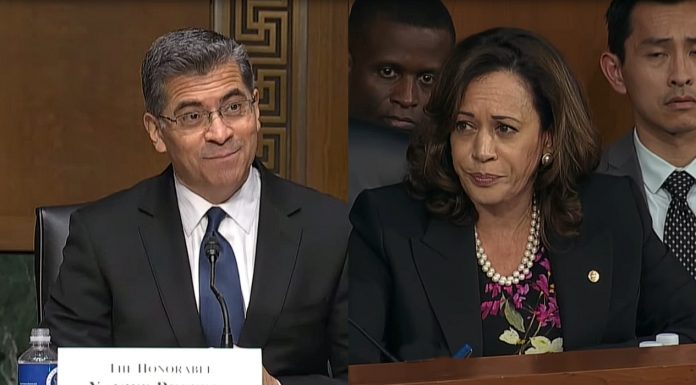In a pending Supreme Court case, the Biden administration and several prominent, leftist civil-rights groups piled on criticism of the California attorney general’s office over its cavalier mishandling of donor data.
The crux of the issue in Americans for Prosperity Foundation v. Becerra and a companion case from the Thomas More Law Center is the radical blue state’s policy of refusing to follow federal law by keeping donor databases private.
In a recent amicus brief, Biden’s Justice Department lawyers came out in support of the two conservative groups, who were appealing the decision by the radical leftist Ninth Circuit Court to uphold the practices, begun under former Gov. Jerry Brown.
They criticized the state for allowing private Schedule B donor rolls that nonprofit groups were obliged to report to be easily accessed by outside parties, saying the “respondent’s ‘history’ of not ‘maintain[ing] Schedule B information as securely as it should have raises a serious concern.”
They also warned of the potential for violating individual free speech rights by creating a chilling effect on those who fear retaliation for their support of a given cause.
“[T]he overall deterrent effect on the exercise of First Amendment rights should be assessed as a function of both variables: the probability of public disclosure and the severity of the harms such disclosure could produce,” said the brief.
The only problem: Those attorneys general happened to be current Vice President Kamala Harris and Xavier Becerra, the current AG who is nominated to be Biden’s secretary of Health and Human Services.
In California, the result has been the targeting of conservative donors, who risk getting canceled or blacklisted simply for their support of the party and its mainstream causes.
Nonetheless, the precedent for the case is based in a civil-rights-era ruling where social-justice activists feared retaliation.
And on a national level, several radical leftist organizations have come out against the practice, including the NAACP, ACLU, PETA and the Council on American–Islamic Relations.
“The disclosure law at issue here, at least as it has been implemented by California, risks undermining the freedom to associate for expressive purposes,” wrote the NAACP in its amicus brief, according to the National Review.
“That freedom … is fundamental to our democracy,” it continued. ” … In light of California’s record of inadvertently publicizing these sensitive documents, its demand should be treated as a de facto public disclosure requirement.”
Among the groups expressing concern over Harris’s and Becerra’s eagerness to dox them was a pair of advocacy groups for Chinese dissidents, founded by survivors of the 1989 Tiananmen Square massacre.
They noted that the lists were not only accessible to those in the US, where voter-intimidation tactics were largely nonviolent, but also to the Chinese Communist Party, which has not hesitated to punish donors still residing in the totalitarian nation.
“Nearly all of Citizen Power Initiatives’ donors and potential donors have significant ties to China—family, business, citizenship—and are vulnerable to all manner of coercion,” wrote one group.
“In 2019, China imprisoned one consistent major donor who is based in the country and had yearly travels to the United States,” it continued. “Another major donor discontinued his support after learning that the Chinese government had discovered his donations. … People’s lives and livelihoods are at stake.”
Becerra has come under fire during his confirmation hearings, not only because of his lack of experience in the health field, but also his unabashedly leftist views.
He has used his role in the AG’s office to launch attacks on conservative groups, including near constant efforts to undermine the Trump administration’s agenda.
In his own court filing responding to the petition, he scoffed at the notion that “any claim that California’s requirement could lead to public harassment or other negative consequences.”
But the Justice Department threw down the evidence, noting that he and Harris both had threatened non-compliant groups who resisted disclosing their donors.
“Charitable organizations that fail to comply are not merely denied a subsidy but also barred from operating and fundraising in the State. . . . [Becerra] has not sought to defend
California’s Schedule B disclosure requirement as a condition on governmental subsidies” it noted.
“When petitioners did not comply with the requirement,” the DOJ continued, Harris had “informed them not only that they might lose their state tax exemptions but also that they could be barred from operating or soliciting contributions in California.”
In spite of the concerns over donor privacy rights, congressional Democrats have included in their controversial HR1 election overhaul provisions that would further force private donors into public.

